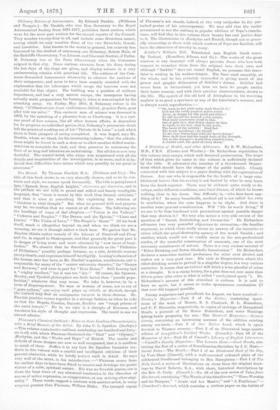The Mount. By Thomas Sinclair, M.A. (Trfibner and Co.)—The title
of this book seems to us very absurdly chosen, and as to its con- tents and style, we cannot speak favourably. The title is paraphrased into " Speech from English heights," obscurant per obscurius, and in the preface we are told, in grand and stilted and barely intelligible language, that "more is meant by this work than literary criticism," and that it aims at something like explaining the relation of 4' thinkers to vital thought." But what its general drift and purpose may be, we confess that we cannot at all divine. The following are the headings of some of tbet' chapters :—" Voices in the Valleys," "Cultures and Peoples," "The Drama and the Epiciat," "Lines and Limits,' "The Vision of Love," "The People's 'Stars.'" Of the book itself, much is altogether beyond us, and when we think we see a meaning, we see it through rather a thick haze. We gather that Mr. Sinclair thinks rather meanly of the labours of Furnivall and Fleay and Co. in regard to Shakespeare, and that generally the great poet is in danger of being more and more obscured by "now races of busy- bodies." We observe that he describes Aristotle as the "Philistine of Philistines," possibly perhaps because, as a rule, Aristotle reasons pretty clearly, and expresses himself intelligibly. Lessing's education of the human race has been, in Mr. Sinclair's opinion, mischievous, and is responsible for many of the "noisier university theories," for "Essays and Reviews," and even in part for " Ecce Homo." Still Leasing had "mighty intellect," but it was too "dry." Of course, the Spencer, Huxley, and Tyndall philosophies are little better than "puerile popu- larities," whatever that may mean. We take it, however, to be a term of disparagement. No man or woman of sense, not to say of pure culture," can enjoy such plays as Othello or Macbeth, though the learned may find an antiquarian interest in these dramas. Mr. Sinclair jumbles names together in a strange fashion, as when he tells .1.1B that the Hegels, Cousins, Guizots, Buckles are "rough priests of the outer temple." Ho is, we take it, a disciple of Erasmus, and emulates his style of thought and expression. The result is one we Cannot admire.


































 Previous page
Previous page